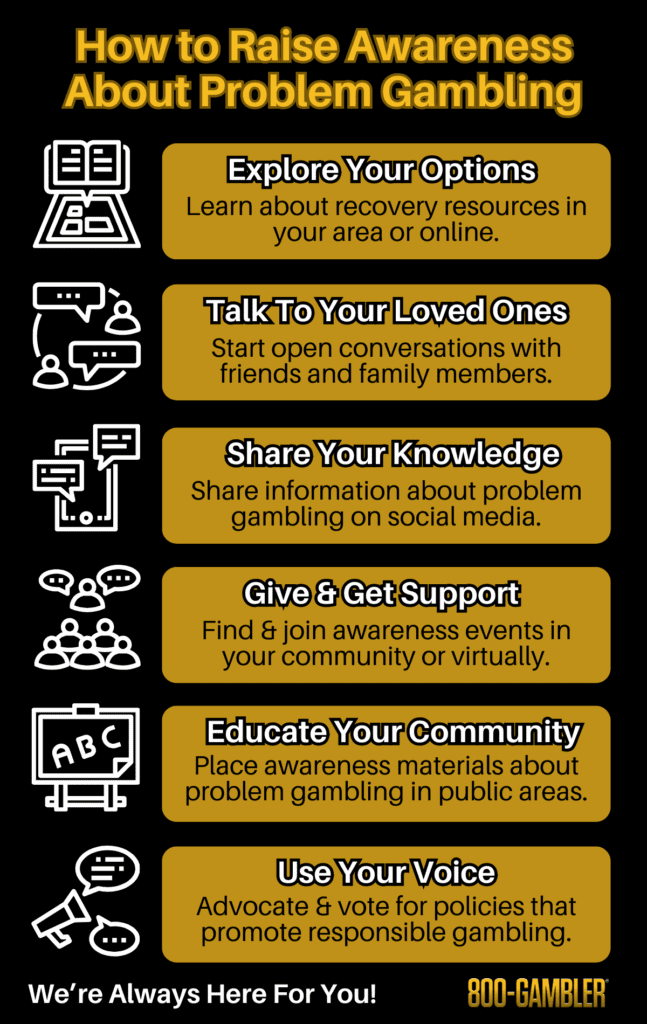Every year, March is recognized as Problem Gambling Awareness Month. This month provides an essential opportunity to educate the public about the warning signs of problematic gambling behavior and the resources available for those who may be struggling. During this important month, organizations across the country, including 800-GAMBLER, work together to raise awareness, promote responsible gambling practices, and connect individuals with the support they need.
Understanding Problem Gambling
Problem gambling refers to gambling behavior that disrupts or damages personal, family, or vocational pursuits. Unlike casual gambling, where individuals set limits and view gambling as entertainment, problem gambling can lead to financial distress, relationship difficulties, and significant emotional challenges.
The behavior exists on a spectrum, ranging from occasional risky gambling to severe concerns that impact daily functioning. Importantly, problem gambling can affect anyone regardless of age, gender, or background. Many individuals who develop gambling problems began with casual participation that gradually escalated over time.
Some common warning signs include:
- Spending more time or money on gambling than intended
- Feeling restless or irritable when attempting to cut down on gambling
- Using gambling as a way to escape problems or relieve stress
- Lying to family members or friends about gambling habits
- Experiencing financial hardship due to gambling losses
- Making multiple unsuccessful attempts to control gambling
Early recognition of these warning signs is crucial for intervention and support.
The Impact of Problem Gambling
Problem gambling extends far beyond the individual, creating ripple effects that touch families, workplaces, and communities. For every person struggling with gambling concerns, an estimated 8-10 additional people are directly affected.
Financial consequences often appear first, with individuals potentially facing debt, bankruptcy, or loss of significant assets. These financial pressures can lead to increased stress, anxiety, depression, and, in some cases, thoughts of self-harm.
Relationships frequently suffer as trust becomes damaged through the concealment of gambling activities or financial losses. Family members may experience confusion, anger, and feelings of betrayal when gambling problems come to light.
Workplaces also feel the impact through decreased productivity, unexplained absences, and potential integrity issues if an employee’s financial situation becomes desperate.
Prevention and Responsible Gambling Practices
Prevention remains the most effective approach to problem gambling. During Problem Gambling Awareness Month, education about responsible gambling practices becomes especially important.
Responsible gambling involves:
- Setting strict time and money limits before beginning to play
- Viewing gambling solely as entertainment, not as a way to make money
- Never chasing losses, which often leads to larger losses
- Balancing gambling with other recreational activities
- Understanding the odds and recognizing that gambling establishments ultimately profit
- Never gambling while experiencing strong emotions or under the influence of substances
For those who choose to gamble, these practices can significantly reduce the risk of developing problems. Many casinos and gambling establishments now offer self-exclusion programs and other tools to help individuals maintain control over their gambling activities.
How to Support a Loved One
If you’re concerned about a loved one’s gambling behavior, your support can make a meaningful difference. While you cannot force someone to change, you can create conditions that encourage positive steps.
Consider these approaches:
- Express your concerns calmly and specifically, focusing on behaviors you’ve observed
- Listen without judgment when they discuss their gambling
- Avoid lecturing or criticizing, which can increase defensiveness
- Encourage them to call 800-GAMBLER for professional guidance
- Offer to help research treatment options or attend support meetings
- Protect your own financial well-being if necessary
- Recognize that recovery takes time and setbacks may occur
Remember that problem gambling responds well to proper intervention and support. With appropriate help, individuals can regain control and rebuild their lives.
Getting Involved in Problem Gambling Awareness Month
Problem Gambling Awareness Month offers numerous opportunities for community involvement. Consider these ways to participate:

Every conversation helps reduce stigma and increases the likelihood that those struggling will seek help.
March serves as a critical reminder that problem gambling affects millions of Americans and their loved ones, but help and hope are readily available. Through education, prevention efforts, and accessible resources like those provided by 800-GAMBLER, we can create communities where gambling problems are recognized early and addressed compassionately.
Problem gambling doesn’t discriminate, and neither do the resources designed to help. Whether you’re personally struggling with gambling concerns or worried about someone you love, know that support is just a phone call away through our toll-free, confidential helpline. We understand the challenges you’re facing and stand ready to help individuals, friends, and family members.
This Problem Gambling Awareness Month, take the step that could change everything — reach out for help. Call 800-GAMBLER today to speak with someone who understands and can guide you toward a healthier future.



